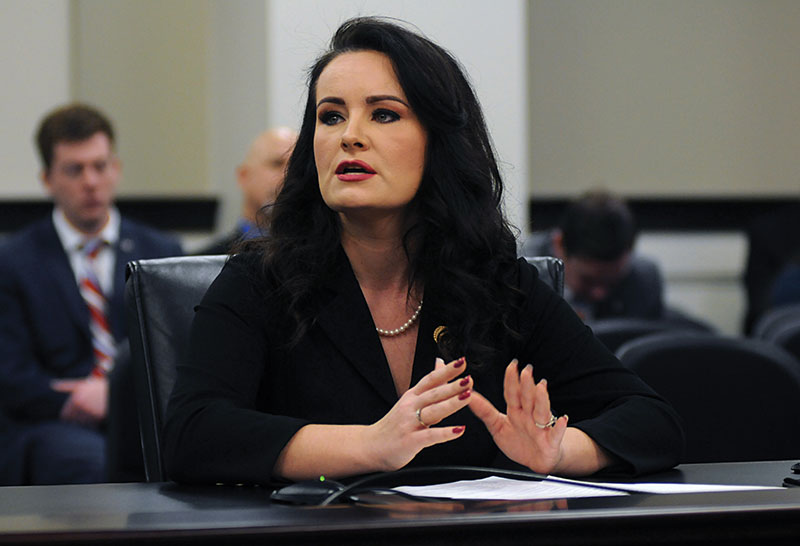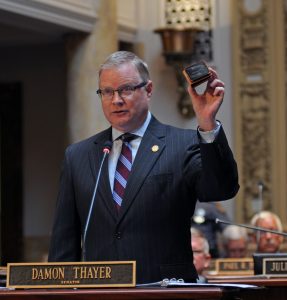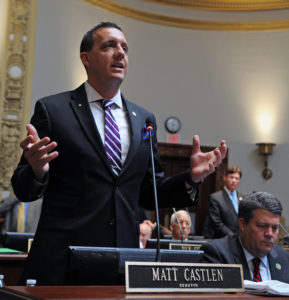
Ever since the founders did us the favor of balancing government across three equal branches, a major departure from the monarchy they had known, political human nature has managed to repeatedly rearrange power.
Power fluctuates, resonates, and redesignates continuously, a constant energy on full display in the current season. From Frankfort to Washington, D.C., to Hong Kong, we see the saga in real time.
Calling the legislature into special session is the sole prerogative of the governor, as noted in the 1891 state constitution. A proposal late in this year’s session would force the governor to quickly convene the legislature for action on some emergency orders.
There is broad latitude for the governor to issue an executive order for emergency circumstances as well as the normal course of state business. So common are executive orders, they are known by the initials “EO” in public policy parlance.
In 1998, lawmakers placed a list of urgent examples into statute, emergencies like floods, tornadoes, dam breaks, power outages, drought, blizzards, sabotage, riots and mass casualty events. Although major health concerns were anticipated, there was no specific mention of a pandemic.
The governor has the emergency power to declare curfews, require local governments to respond to urgent needs, and limit or prohibit the sale or consumption of goods—except firearms—when dire circumstances warrant.
Another recent suggestion to change the power scales came from the House Speaker David Osborne. He laid out the steps for the legislature to call itself back into session, a substantial change that would require a constitutional amendment.
After former Gov. Matt Bevin issued a number of pardons at the end of his term, controversy arose over some cases. Only the governor has pardon power. The legislative reaction was to consider when pardons should—and should not—occur.
Similar shifts in power could be on the Washington horizon. Cloture, essentially the end of debate on an issue, takes 60 votes in the U.S. Senate. Senate Leader Mitch McConnell, a preservationist when it comes to Senate rules, has stuck with 60.
Now some Democrats, hoping to have a slim majority in 2021, say the rule must be changed to a simple majority–51 votes–in order to move decisions stuck without the three-fifths vote.
Executive orders date back to President George Washington and have been used by every president but one. The power likely traces to the thrones of Europe and elsewhere, where power was used as rulers saw fit. The new American model kept it, but tightly defined it.
Abraham Lincoln “freed the slaves” as history notes by the power of an executive order. The Emancipation Proclamation, without question the most famous use, is analyzed to this day.
President Donald Trump engaged executive power to get the wall under construction at the Southern border. Even with protests, he prevailed. More recently the president issued EOs for major moves including the extension of unemployment benefits when Congress adjourned without a second CARES Act.
EOs are often subject to legal review and action. President Harry Truman’s order overtaking steel mills to ensure strikes did not interrupt the war supply was overturned by the Supreme Court. Trump’s “travel ban” was temporarily halted by the bench. Gov. Beshear’s orders will soon be scheduled for their day in court.
EOs can also be rejected via legislative process and rules changed accordingly, but the legislature has to be in session to do so. Thus, Kentucky will see more serious examination of executive power when lawmakers return Jan. 5 for a 30-day session.
Rep. Savannah Maddox tried to have executive orders examined and changed late in the 2020 session, but time was short, and the concept was new. Now she has a revised law ready for consideration in light of pushback over executive actions related to COVID-19.
Concerned that there was a restriction of commerce as well as infringement on civil rights by orders of the governor, Maddox would narrow the scope of the emergency, and require “clear and convincing evidence” of the need for an EO.
If an EO came during a legislative session, it would have a 14-day duration. Legislative action could follow, potentially altering gubernatorial action.
But if the legislature is out, the House and Senate must be called back if an EO is to go beyond 14 days. This extraordinary session must convene within 28 days of the date of the emergency order, a significant change indeed.
For a “disease outbreak”—a new term to add—the order could go 21 days, then the legislature, if not in session, must return within 28 days of the EO date.

Asked about BR 130, as the Maddox proposal is known, Gov. Beshear said, “…wouldn’t you worry if the time period that gave you the authority that you need was so short that we lost our will to do the right thing too early?
“It would be really hard by committee or by several hundred people making those decisions and at a time when politics is so crazy,” Beshear added.
Still, Maddox is troubled by the closure of places of worship and sees discrepancy with “big box stores being open, while small, locally owned businesses were ordered to close.”
Not alone in her thinking, Maddox has like-minded senators on her side. “Limiting the governor’s ability to extend a state of emergency in perpetuity will be among the top priorities of the legislature next year,” said Sen. Damon Thayer, the GOP majority floor leader.

Sen. Matt Castlen, who lives outside of Owensboro, would draw the legislature squarely into the process. His proposal would call for the General Assembly to give approval for an EO to extend more than 30 days.
Maddox says the blanket approach of EOs likely has unequal impacts for small counties like she represents versus Louisville, for example. Castlen adds, “what’s good for metro Louisville isn’t necessarily good for Calhoun,” a small town in his district.
Castlen hopes for a bipartisan vote, noting that the change “would only come into effect under abnormal circumstances, such as a pandemic.”
Reflecting with the press during a briefing, Gov. Beshear offered caution about how the changes could negatively impact the emergency process, if the legislative were debating steps as they are taken. Others, too, shaken by the need to act quickly and decisively to COVID-19, have expressed such warning.
“This thing is not just about power,” Beshear said. Weighing the current balance of power, the General Assembly is super-majority Republican. Were a bill to pass, then get a veto, the House and Senate have the potential to override the veto to make law.
The power puzzle sticks as leaders rearrange the pieces. ■

Bob Babbage and Julie Babbage are with Babbage Cofounder, a leading government relations firm.




















Add Comment